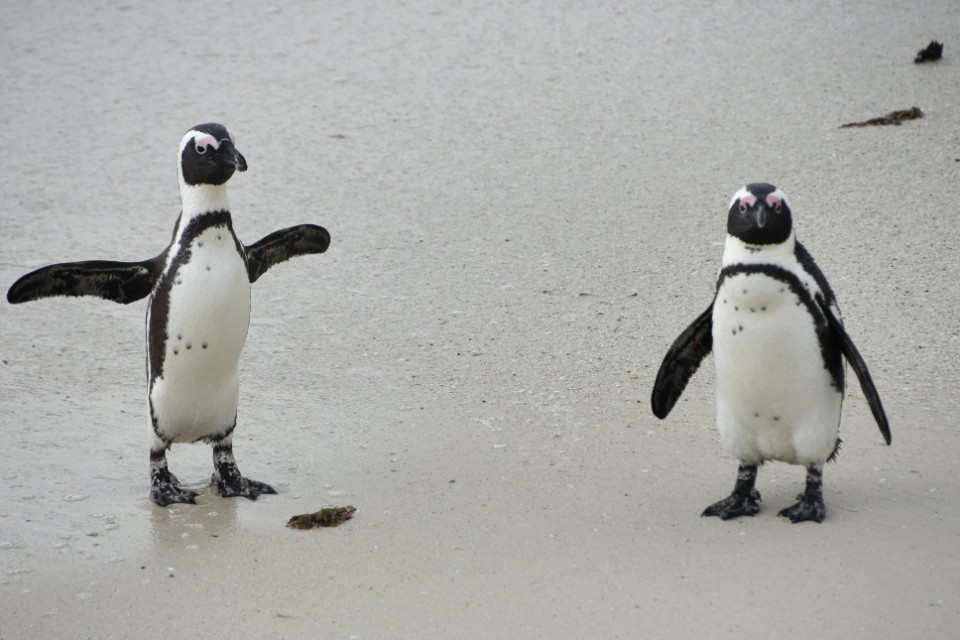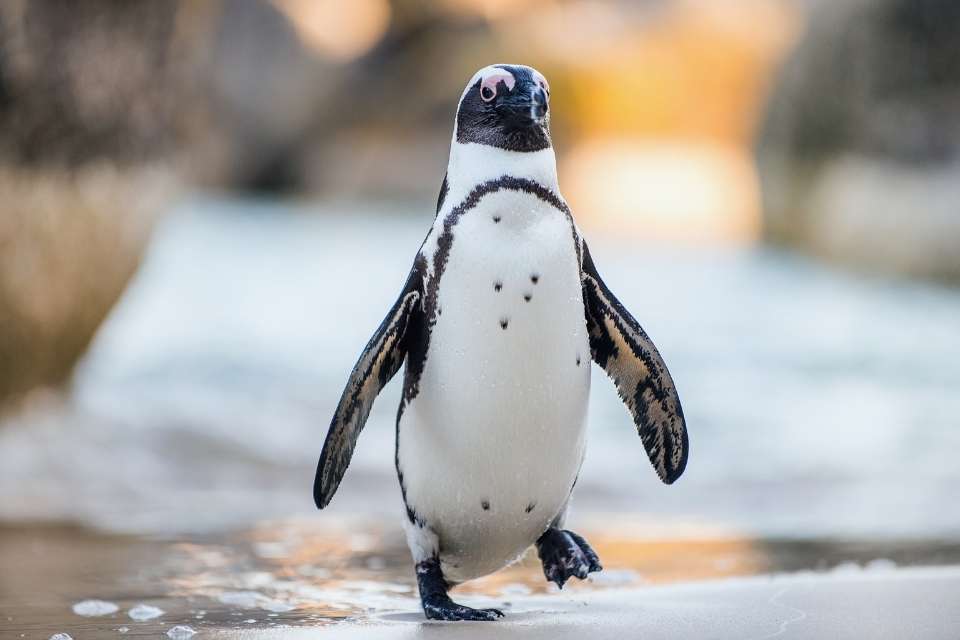Have you ever wondered if penguins poop? Well, we’re here to enlighten you on the fascinating world of penguin waste management. Penguins may not pee like other bird species, but they certainly have their unique way of eliminating waste.
Unlike mammals, penguins lack the ability to urinate due to the absence of a urethra and urinary bladder. Instead, they produce waste in the form of uric acid, which is expelled from their bodies. Penguins eliminate their bodily waste in the form of a semi-solid white paste known as guano.
Penguins have some interesting defecation habits. They often release their poop in a projectile-like manner due to their higher internal pressures, which allows their feces to be projected up to four feet away, sometimes even landing on other penguins!
It seems that penguins are not particular about where they poop and will do so wherever they happen to be, including within the boundaries of their nesting sites.
Penguin poop has some distinct characteristics. It has a unique odor, described as a combination of old tobacco, ammonia, and rancid shrimp. Penguins have a fast metabolism, leading them to poop every 20 minutes.
This frequent excretion releases nitrogen into the soil, contributing to the production of nitrous oxide, a greenhouse gas.
Key Takeaways:
- Penguins do not urinate but eliminate waste in the form of uric acid and feces.
- Penguin poop is a semi-solid white paste known as guano.
- Penguins have unique defecation habits, often projecting their poop.
- Penguin poop has a distinct odor, resembling a combination of old tobacco, ammonia, and rancid shrimp.
- Penguins have a fast metabolism, resulting in frequent pooping every 20 minutes.
Penguin Excrement: The Science Behind Penguin Poop
When it comes to penguin excrement, there’s more to it than meets the eye. Let’s delve into the fascinating world of penguin waste management and discover the science behind penguin poop.
The Penguin Diet:
Penguins have a unique diet primarily consisting of fish, squid, and krill. These marine creatures provide the nutrients necessary for penguins to thrive in their icy habitats. As penguins consume their prey, the digestion process begins, leading to the formation of their excrement.
“Penguins eat krill, their poop can have a pink coloration due to the pigments in the krill.
Interestingly, when penguins feast on krill, their poop can have a pinkish hue due to the presence of pigments in these tiny crustaceans. This variation in color adds to the diversity of penguin feces characteristics.
Penguin Waste Elimination:
Penguins excrete their waste through a cloaca, a common opening for excretion and reproduction. Unlike mammals, penguins lack bladders and do not have the ability to urinate. Instead, their waste is expelled in the form of uric acid and feces.
This unique waste elimination process is an essential part of penguin waste management.
When penguins defecate, their waste often travels in a projectile-like manner. This phenomenon is due to the unique digestive system of penguins, which results in a forceful release of their feces. These characteristics make penguin excrement distinctive and contribute to the ecological aspects of penguin ecology.
Myth Busted: Penguin Pee and Antarctic Ice
Contrary to popular belief, penguins do not urinate. It is a misconception that penguins’ urine makes up a significant percentage of the ice in the Antarctic Zone. Penguins lack the ability to urinate due to their anatomical structure.
Instead, they expel their waste in the form of uric acid, which is combined with their feces to form guano. Therefore, the claim that penguin urine contributes to the composition of Antarctic ice is false.
Penguins have a unique excretion system where waste is eliminated through a cloaca, a common opening for excretion and reproduction. Unlike mammals, penguins do not have bladders and cannot store or release urine separately.
Their waste, in the form of uric acid and feces, is expelled through the cloaca as guano. This misconception may have originated from the observation of large penguin colonies and the presence of guano, leading to the assumption that urine played a significant role.
Penguin waste management is an integral part of their ecology and has ecological effects beyond their colonies. While penguins do not contribute urine to the composition of Antarctic ice, their frequent excretion releases nitrogen into the soil.
This nitrogen is then converted by bacteria into nitrous oxide, a greenhouse gas that contributes to climate change. So, while penguins may not pee on the ice, their poop does play a role in the nitrogen cycle and the release of greenhouse gases into the atmosphere.
The Great Penguin Poop Show: Frequency and Location
Penguins, with their unique pooping habits, are quite the spectacle to behold. These fascinating creatures have a high frequency of defecation, with each penguin pooping every 20 minutes on average. That’s right, every 20 minutes!
Imagine the excitement of witnessing a penguin launch its waste in a projectile-like manner, reaching distances of up to four feet. It’s a real showstopper!
But where do penguins choose to do their business? Well, they don’t have a designated spot for pooping. Penguins will happily eliminate waste wherever they happen to be, including within the boundaries of their nesting sites.
It seems that the urge to relieve themselves outweighs the need for finding a more discreet location.
The frequency and location of penguin poop can have significant effects on their environment. Penguin colonies, with their high population density, produce large amounts of waste.
This waste accumulation can impact the surrounding area, affecting the health of the ecosystem. So, next time you encounter a penguin colony, be prepared for the great penguin poop show!
Penguin Poop: From Nitrogen to Laughing Gas
As we delve deeper into the world of penguins and their excretions, we uncover a fascinating ecological role played by penguin poop. These adorable creatures, with their unique diet and frequent pooping habits, contribute to the release of nitrous oxide, commonly known as laughing gas, into the atmosphere.
But how does this process work?
When penguins consume their primary diet of fish, squid, and krill, they unknowingly ingest nitrogen present in their prey. Once the penguins digest their food and eliminate waste in the form of feces, the nitrogen is released into the soil.
This nitrogen-rich soil becomes a breeding ground for bacteria that convert the nitrogen into nitrous oxide, a potent greenhouse gas.
Did you know? Penguin poop contributes to the release of laughing gas, a greenhouse gas that affects climate change.
Although penguins may seem small in size, the collective impact of their frequent pooping habits can have significant ecological consequences.
With their fast metabolism, penguins typically eliminate waste every 20 minutes, resulting in a continuous supply of nitrogen-rich feces. As a result, penguin colonies become key contributors to the production of nitrous oxide, adding to the pool of greenhouse gases in the atmosphere.
The Nitrogen Cycle and Penguin Poop
The nitrogen cycle, a natural process that occurs in various ecosystems, involves the movement and transformation of nitrogen through different environmental compartments. In the case of penguins, their excrement plays a crucial role in this cycle.
By releasing nitrogen into the soil, penguins provide an essential nutrient for plant growth. However, the subsequent conversion of this nitrogen into nitrous oxide contributes to climate change.
While penguins may be unaware of the ecological impact of their waste, their frequent pooping habits highlight the interconnectedness of ecosystems and the delicate balance between different organisms.
Understanding the role of penguin poop in the production of nitrous oxide sheds light on the broader implications of animal excretions in environmental processes and climate change.
Conclusion
So, do penguins poop? Absolutely! Penguins may be known for their adorable waddles and sleek feathers, but they certainly leave their mark in the form of poop.
Penguins have a unique waste management system. Unlike other birds, they lack the ability to urinate. Instead, they produce waste in the form of uric acid and feces, which combine to create the famous penguin poop, also known as guano.
Penguin poop comes in various colors, depending on their diet. From white and grey to pink and brown, the hues of their feces can provide insights into their eating habits. Penguins have fast metabolisms, pooping every 20 minutes on average, which contributes to the release of nitrous oxide, a greenhouse gas.
Penguins are not picky about where they poop. They will do their business wherever they happen to be, including within their nesting sites. This frequent pooping and the resulting waste management play an important role in the ecological balance of penguin habitats.
FAQ
Do penguins urinate?
No, penguins do not urinate. They lack the ability to urinate due to the absence of a urethra and urinary bladder.
How do penguins eliminate waste?
Penguins excrete waste in the form of uric acid and feces, which combine to form a semi-solid white paste known as guano.
What color is penguin poop?
Penguin poop can be white, grey, pink, or brown depending on their diet. When penguins eat krill, their poop can have a pink coloration.
How often do penguins poop?
Penguins have a fast metabolism and poop approximately every 20 minutes, eliminating waste up to 6-8 times an hour.
Where do penguins poop?
Penguins do not have specific locations for pooping and will eliminate waste wherever they happen to be, including within their nesting sites.
Does penguin poop have a smell?
Yes, penguin poop has a distinct odor described as a combination of old tobacco, ammonia, and rancid shrimp.
How does penguin poop affect the environment?
Penguin poop releases nitrogen into the soil, which bacteria convert into nitrous oxide, a greenhouse gas that contributes to climate change.
Do penguins’ urine contribute to Antarctic ice?
No, penguins do not urinate, so the claim that penguin urine contributes to the composition of Antarctic ice is false.


